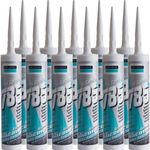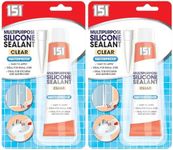Buying Guide for the Best Shower Sealants
Choosing the right shower sealant is crucial for ensuring a watertight and durable seal in your bathroom. A good sealant prevents water from seeping into unwanted areas, which can lead to mold, mildew, and structural damage. When selecting a shower sealant, consider the type of material you are sealing, the environment it will be exposed to, and the ease of application. Understanding the key specifications will help you make an informed decision that suits your specific needs.Material CompatibilityMaterial compatibility refers to how well the sealant adheres to the surfaces you are working with, such as tiles, glass, or metal. This is important because a sealant that doesn't bond well can lead to leaks and damage. Sealants are often formulated for specific materials, so it's crucial to choose one that matches your shower's surfaces. For example, silicone sealants are versatile and work well with most materials, while acrylic sealants might be better for certain plastics. Consider the materials in your shower and choose a sealant that is specifically designed to adhere to them.
Water ResistanceWater resistance is the sealant's ability to withstand exposure to water without degrading. This is a critical feature for shower sealants, as they are constantly exposed to moisture. Sealants are generally categorized by their level of water resistance, with some being more suitable for areas with constant water exposure. For a shower, you want a sealant that is highly water-resistant to prevent leaks and ensure longevity. Look for products labeled as waterproof or specifically designed for bathroom use to ensure they can handle the wet environment.
Mold and Mildew ResistanceMold and mildew resistance indicates how well the sealant can prevent the growth of mold and mildew, which thrive in damp environments like showers. This is important for maintaining a clean and healthy bathroom. Sealants with added fungicides or antimicrobial properties are designed to resist mold and mildew growth. If your bathroom is prone to humidity and poor ventilation, prioritize a sealant with strong mold and mildew resistance to keep your shower area hygienic and easy to maintain.
Curing TimeCuring time is the period it takes for the sealant to fully set and become waterproof. This is important because using the shower before the sealant has cured can compromise its effectiveness. Curing times can vary from a few hours to several days, depending on the product. If you need to use the shower soon after application, look for a sealant with a quick curing time. However, if you can afford to wait, a longer curing time might offer a stronger bond. Consider your schedule and choose a curing time that fits your needs.
Ease of ApplicationEase of application refers to how simple it is to apply the sealant effectively. This is important for achieving a neat and professional finish, especially if you're doing the job yourself. Some sealants come in easy-to-use tubes with applicator tips, while others might require a caulking gun. If you're inexperienced, look for a product that is user-friendly and comes with clear instructions. Consider your comfort level with DIY projects and choose a sealant that you feel confident applying.
















